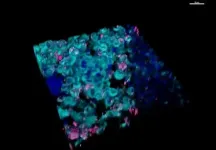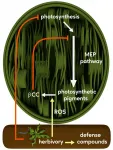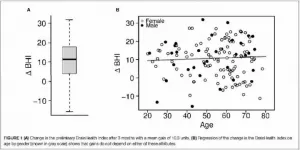Health behavior outcomes can help determine efficacy of interventions for multimorbidities
Scaling up patient-centered interdisciplinary care for multimorbidity: A pragmatic mixed-methods randomized controlled trial
2021-03-09
(Press-News.org) Intervention research focusing on patients with multiple, simultaneous chronic illnesses is a priority for health organizations such as the National Institutes of Health and Canadian Institutes of Health Research. This is important as physicians seek to better understand how one disease may influence the course of another coexisting one, and how to best care for patients who are battling multiple health issues. Researchers conducted a controlled trial in patients 18 to 80 years with three or more chronic conditions. They collected quantitative data and conducted in-depth interviews with patients, family members and health care providers, then measured the effectiveness of a four-month intervention based on changes in care delivery. For the study, health care professionals were trained to coach patients on adopting healthy lifestyle changes and managing their own health.
After four months, the intervention showed no effect on quantitative measures of self-management or self-efficacy. However, patients reported in qualitative interviews that the intervention improved their self-management and self-efficacy. The authors warn that complex interventions can be difficult to evaluate and important effects may be missed in evaluations that only include quantitative assessments.
INFORMATION:
Scaling Up Patient-Centered Interdisciplinary Care for Multimorbidity: A Pragmatic Mixed-Methods Randomized Controlled Trial
Martin Fortin, MD, MSc, et al
Universite? de Sherbrooke, Sherbrooke, Québec, Canada
https://www.annfammed.org/content/19/2/126
ELSE PRESS RELEASES FROM THIS DATE:
2021-03-09
Cooperation is generally a good thing -- working together to reach a goal.
But in the case of cancer, it can be detrimental. University of Cincinnati researchers have discovered that cooperation between two key genes drive cancer growth, spread and treatment resistance in one particularly aggressive type of breast cancer.
The good news is, though, with this knowledge, they can continue to aim their targeted treatments at these genes, singularly and together, to stop breast cancer in its tracks.
This study is published in the March 9 online edition of the journal Cell Reports.
"According to the American Cancer Society's estimate, over 280,000 new cases of invasive breast cancer will be diagnosed in women in 2021," explains Xiaoting Zhang, PhD, professor and Thomas Boat Endowed Chair ...
2021-03-09
Some of Princeton's leading cancer researchers were startled to discover that what they thought was a straightforward investigation into how cancer spreads through the body -- metastasis -- turned up evidence of liquid-liquid phase separations: the new field of biology research that investigates how liquid blobs of living materials merge into each other, similar to the movements seen in a lava lamp or in liquid mercury.
"We believe this is the first time that phase separation has been implicated in cancer metastasis," said Yibin Kang, the Warner-Lambert/Parke-Davis Professor of Molecular Biology. He is the ...
2021-03-09
Broad political, economic, and social factors influence disciplinary punishment. In particular, over the last half century, such considerations have shaped jurisdictions' use of the death penalty, which has declined considerably since the 1990s. A new study examined the factors associated with use of the death penalty at the county level to provide a fuller picture of what issues influence court outcomes. The study concludes that partisan politics, religious fundamentalism, and economic threat influenced local decisions about the death penalty. The study also found that the size of the African American population, which ...
2021-03-09
CHAPEL HILL, NC -- In a viewpoint perspective published in JAMA on March 9, 2021, a University of North Carolina Lineberger Comprehensive Cancer Center researcher and two other experts endorsed the Center for Medicare & Medicaid Services' (CMS) requirement for a patient and their doctor to engage in a shared discussion of benefits and harms before proceeding with a low-dose spiral computed tomography (LDCT) scan as a method for preventing lung cancer death. An accompanying evidence report detailed the benefits and harms from screening, suggesting that shared decision-making between a patient ...
2021-03-09
URBANA, Ill. - If you haven't been the parent or caregiver of an infant in recent years, you'd be forgiven for missing the human milk oligosaccharide trend in infant formulas. These complex carbohydrate supplements mimic human breast milk and act like prebiotics, boosting beneficial microbes in babies' guts.
Milk oligosaccharides aren't just for humans, though; all mammals make them. And new University of Illinois research suggests milk oligosaccharides may be beneficial for cats and dogs when added to pet diets.
But before testing the compounds, scientists had to find them.
"When we first looked into this, there had only been one study on milk oligosaccharides in dogs, and none in domestic cats. The closest were really small studies on a single lion and a single ...
2021-03-09
In a new study in PNAS, an international team of researchers including scientists from the Max Planck Institute for Chemical Ecology has shown that Arabidopsis thaliana plants produce beta-cyclocitral when attacked by herbivores and that this volatile signal inhibits the methylerythritol 4-phosphate (MEP) pathway. The MEP pathway is instrumental in plant growth processes, such as the production of pigments for photosynthesis. In addition to down-regulating the MEP pathway, beta-cyclocitral also increases plant defenses against herbivores. Since the MEP pathway is only found in plants and microorganisms, but not animals, knowledge of a signal molecule like beta-cyclocitral opens up new possibilities for the development ...
2021-03-09
Brazilian researchers who study a native venomous fish have confirmed a route to drug development for the treatment of chronic inflammatory diseases such as multiple sclerosis and asthma.
The venomous toadfish Thalassophryne nattereri contains a peptide (TnP) with anti-inflammatory and anti-allergic potential. Confirmation of this potential has now come via the zebrafish Danio rerio, a popular aquarium species native to South Asia that shares 70% of its genome with humans and is widely used as a model for in vivo trials in drug development.
The researchers tested TnP in D. rerio to measure its toxicity. In a little over a year, their research showed that the peptide is safe. It did not cause cardiac dysfunction or neurological problems in the toxicity tests ...
2021-03-09
Health care systems could save lives and minimize losses by optimizing resource allocation and implementing mitigation strategies, according to two new studies. Colorado State University researchers explored how our health care systems might perform under multiple disasters and multiple waves of COVID-19, and how we can keep them functioning when we need them most.
In the first study, published in Nature Communications, Civil and Environmental Engineering Ph.D. student Emad Hassan and Associate Professor Hussam Mahmoud investigated the compound effects of pandemics and natural disasters on health care systems. They combined wildfire ...
2021-03-09
DALLAS (March 9, 2021) - Better brain health and performance for humankind is one step closer to reality with the successful trial of the groundbreaking BrainHealth Project. A cross-disciplinary team with the Center for BrainHealth® at The University of Texas at Dallas unveiled an easy-to-use online platform that delivers a novel, science-backed approach to measuring, improving and tracking one's own brain fitness.
A key innovation of the Project centers on the BrainHealth Index™ (BHI), which is based on a multidimensional definition of brain health and its upward potential. The BHI is a composite derived from a series of best-in-class assessments that explore ...
2021-03-09
Farmers in the Midwest may be able to bypass the warming climate not by getting more water for their crops, but instead by adapting to climate change through soil management says a new study from Michigan State University.
"The Midwest supplies 30% of the world's corn and soybeans," said Bruno Basso, an ecosystems scientist and MSU Foundation Professor in the Department of Earth and Environmental Sciences within the College of Natural Science. "These crops are sensitive to temperature and water changes."
Previous studies have suggested that by 2050, the Midwest will need about 35% more water to sustain its current levels of corn and soybean yields. But research done by Basso and colleagues found that the data does not support this idea. The Midwest is in a unique location that ...
LAST 30 PRESS RELEASES:
[Press-News.org] Health behavior outcomes can help determine efficacy of interventions for multimorbidities
Scaling up patient-centered interdisciplinary care for multimorbidity: A pragmatic mixed-methods randomized controlled trial







